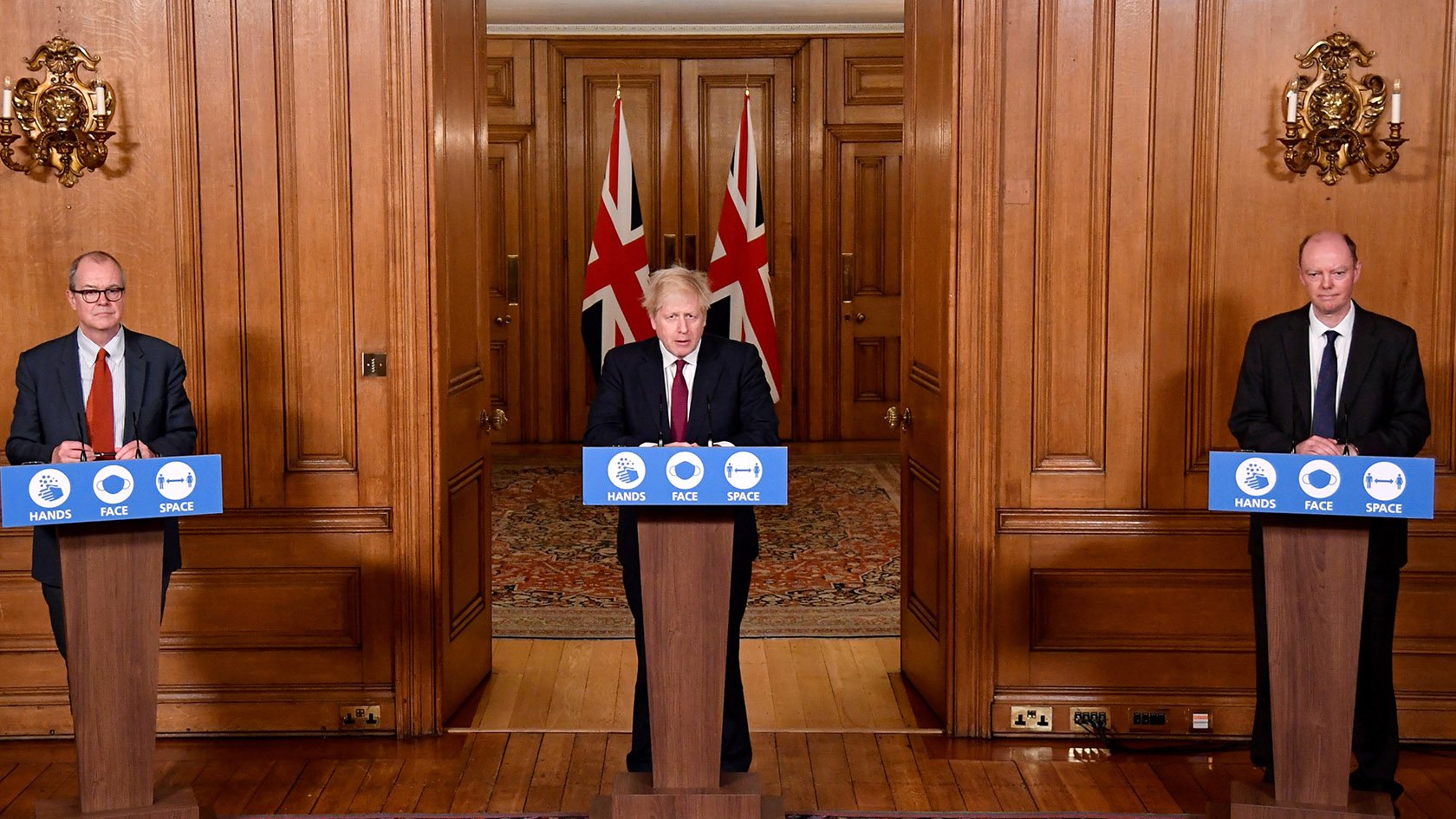
The planned relaxation of Covid rules for Christmas has been scrapped for large parts of south-east England and cut to just Christmas Day for the rest of England.
From midnight, a new tier four will be introduced in areas including London, Kent, Essex and Bedfordshire.
For the rest of the country, the three household mixing limit has been cut from five days to just Christmas Day.
Those in tier four cannot mix indoors with anyone not from their household.
The whole of Wales will also be placed under lockdown from midnight with Christmas plans cancelled for all but one day.
First Minister Mark Drakeford made the announcement after urgent talks over the new variant of coronavirus.
Prime Minister Boris Johnson announced the changes for England at a Downing Street briefing after scientists said a new coronavirus variant is spreading more rapidly.
Tier four restrictions will apply in all tier three areas in the South East, covering Kent, Buckinghamshire, Berkshire, Surrey (excluding Waverley), Gosport, Havant, Portsmouth, Rother and Hastings.
It will also apply in London (all 32 boroughs and the City of London) and the East of England (Bedford, Central Bedford, Milton Keynes, Luton, Peterborough, Hertfordshire, Essex (excluding Colchester, Uttlesford and Tendring).
A stay-at-home order will be issued to residents in tier four, with exemptions for those who have to travel to work or for education.
Social mixing will be cut to meeting one person in an open public space.
In tier four areas, all non-essential retail will have to close, along with hairdressers, nail bars, indoor gyms and leisure facilities.
People will be advised not to travel into a tier four area.
The restrictions will last for two weeks, with the first review due on 30 December.
Political correspondent Nick Eardley said a tightening of restrictions was expected to be announced in some other parts of the UK too.
The decision follows information presented to Prime Minister Boris Johnson about the new variant of coronavirus, which has been identified and is known as VUI.
Mr Johnson told the Downing Street briefing: "I know how disappointing this will be, but we have said throughout this pandemic that we must and we will be guided by the science.
"When the science changes, we must change our response. When the virus changes its methods of attack we must change our method of defence and as your prime minister I sincerely believe there is no alternative open to me."


The steep increase in the proportion of coronavirus cases linked to this new variant is strong evidence that it is driving transmission.
In London, 28% of cases were as a result of this new mutation in mid-November, but that has now increased to more than 60%.
It explains why, during the second lockdown, cases started to increase in London, while in Kent the tier three measures appear to have had little impact in recent weeks.
As England's chief medical adviser Prof Chris Whitty says, this is a bad moment, but there is also some hope.
The prime minister announced 350,000 people had been vaccinated so far in the first two weeks of the programme.
In the coming weeks, the number of GP-led vaccination clinics should increase six-fold, while approval of a second vaccine made by Oxford University could pave the way for mass vaccination centres to be set up in sports stadiums and conference centres.
That could see two million people a week being vaccinated. With 12 million over-65s vaccinated in a matter of months, this could start to feel very different.
But for now, the slog of the pandemic continues - and for many it just got harder.

Mr Johnson said the new restrictions were necessary because of the spread of a variant of coronavirus which was transmitting faster than the original.
He said analysis from New and Emerging Respiratory Virus Threats Advisory Group (Nervtag) suggests the new variant could increase the R by 0.4 or more and although there is considerable uncertainty it may be up to 70% more transmissible then the old variant.
350,000 people in the UK have so far received their first dose of the Covid-19 vaccine, Mr Johnson said.

- SOCIAL DISTANCING: Can I give my friends a hug?
- FACE MASKS: When do I need to wear one?
- TESTING: How do I get a virus test?
- SYMPTOMS: What are they and how to guard against them?


- CHRISTMAS SPECIALS ON BBC IPLAYER: 110 festive favourites to get you in the Christmas mood
- THE NIGHT MANAGER: Start watching John le Carré's twisted spy thriller


How will these latest restrictions affect your plans for Christmas? Email haveyoursay@bbc.co.uk.
Please include a contact number if you are willing to speak to a BBC journalist. You can also get in touch in the following ways:
- WhatsApp: +44 7756 165803
- Tweet: @BBC_HaveYourSay
- Please read our terms & conditions and privacy policy
If you are reading this page and can't see the form you will need to visit the mobile version of the BBC website to submit your question or comment or you can email us at HaveYourSay@bbc.co.uk. Please include your name, age and location with any submission.
https://news.google.com/__i/rss/rd/articles/CBMiJmh0dHBzOi8vd3d3LmJiYy5jby51ay9uZXdzL3VrLTU1Mzc5MjIw0gEqaHR0cHM6Ly93d3cuYmJjLmNvLnVrL25ld3MvYW1wL3VrLTU1Mzc5MjIw?oc=5
2020-12-19 16:40:00Z
52781253134774
Tidak ada komentar:
Posting Komentar